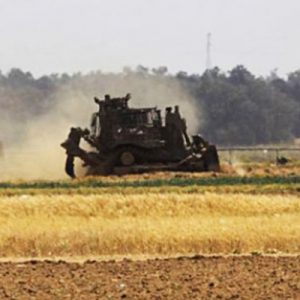Farming in Palestine, an essential activity for the national economy, was already suffering from military attacks and the Israeli blockade. The sector now faces further damages due to the COVID-19 pandemic and government response measures, including lockdown.
“Palestinian farmers are unable to access the necessary agricultural inputs, lands and markets due to the lockdown,” said Samar Khuzundar, an activist from the Palestinian Hydrology Group, in an interview with Real World Radio.
“The pandemic has negatively impacted already deteriorating Palestinian socioeconomic conditions, threatening further devastating impacts on the food security and livelihood of the Muslim and Arab populations, including small farmers,” she added. Khuzundar, who holds a Master’s degree in Environmental Sciences and Water, is a resident of the Gaza Strip.
The Palestinian Hydrology Group is a member of local environmental network PENGON [1] (Friends of the Earth Palestine [2]). As part of PENGON’s work advocating for environmental human rights in Gaza, in cooperation with the Heinrich Böll Stiftung foundation, the network set up the interview between Samar and the radio.
In the interview, Samar explained that since 1970, the agricultural sector in Gaza has rapidly deteriorated as a result of Israeli practices, and further worsened with the blockade and the “endless” restrictions, for instance on access to land. “Much of the agriculture and grazing lands in Gaza are located near the border with Israel. This means that the Palestinian farmers are prohibited from reaching their land and those entering this buffer area are risking their lives as they may come under fire.” Cultivated lands could also be invaded at any moment by Israeli war tanks or similar military machinery.
Beyond the agricultural sector, there are several factors that damage life in general in Gaza. These include: lack of access to water and energy, infrastructure being damaged by Israeli attacks, and serious environmental pollution. [3] “The severity of power cuts continues to this day, ranging from 18 to 20 hours a day. This puts the thousands of donums (1000m2) of land planted with seasonal vegetable crops across the Gaza Strip at risk of total loss, due to irregular irrigation and insufficient pumping from water wells,” stated Samar.
In addition to the factors that challenge Palestinian farmers and their livelihoods, special reference must be made to the ongoing political instability in the area and the extreme weather events associated with climate change.
Samar also warned that the Palestinian fishing industry has practically collapsed. This means ensuring the right to food is a huge challenge, especially in Gaza where exports “are almost completely banned” and “imports are severely restricted.”
Impacts of the crisis on women
Women farmers, and especially those managing households, are among the most severely impacted by the Israeli attacks on agriculture, the economic blockade, COVID-19 and the measures taken by the government to face these issues.
Samar told us that women’s participation is not equitably represented or readily recognised in their communities “Based on this, during the current COVID-19 crisis, the negative impacts on women farmers will not be clear and might be understated,” warned Samar. “Therefore, an immediate and effective intervention and solution need to be put in place and must focus on the female farmers particularly,” she demanded.
The activist listed the interventions needed: continuous monitoring and analysis of the impacts of COVID-19 on agricultural sectors; ensure the health of farmers, and in case of infection, farmers should be isolated and compensated for their losses; provide support to small holding farmers, especially women, and train them on how to improve the quality, safety and shelf life of their products; provide market access for agriculture products.
“The very first demand that I ask for as a Palestinian citizen living in Gaza is that the blockade should be totally and completely lifted,” she demanded. “Also, as a Palestinian woman, I call for policies and regulations that promote gender equality for Palestinian women and the right to be paid equally as men,” she added. “Finally, I demand that all agricultural organisations and key actors hold theoretical and practical trainings for farmers and stakeholders, about food security and how to achieve it.
*The quotes included in this piece are, of course, the responsibility of the interviewees. The rest of the piece is the full responsibility of Real World Radio (Friends of the Earth International).
